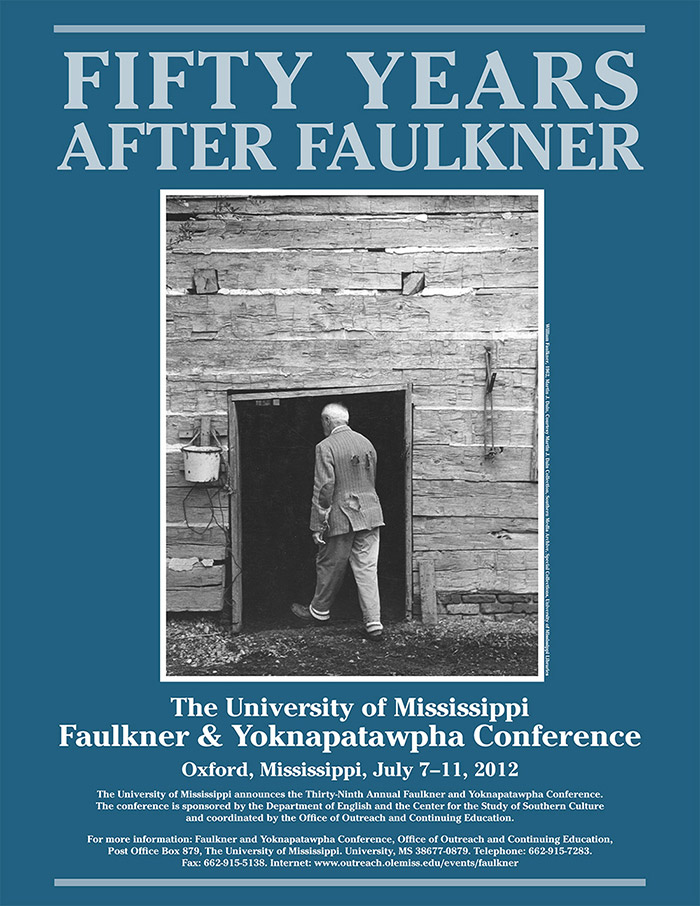
Panel. William Faulkner, The Francis Terry Leak Ledgers, and the Forms of History
Location
Yerby Center Auditorium
Start Date
11-7-2012 8:00 AM
Description
- Mapping Family Geographies: Leaks and Fa(u)lkners / Patrick E. Horn, University of North Carolina at Chapel Hill
This paper will be the first in a three-part presentation analyzing the influence of the Francis Terry Leak plantation ledgers on Faulkner’s fiction. Sally Wolff’s recent work revealed that Faulkner spent hours with the volumes, taking notes and even exclaiming angrily at the long-deceased diarist. Faulkner’s reading of these ledgers is restaged in the fourth chapter of “The Bear,” in which the McCaslin ledgers reveal Isaac’s great-grandfather’s transgressions, inciting his repeated question, “But why?” Joel Williamson has suggested that Faulkner’s great-grandfather may have engaged in a sexual relationship with his own mixed-race daughter. The cryptic and fragmentary record of the fictive plantation ledgers reveals Faulkner’s contradictory urge to narrate this family history, even as he obscured it. - A Natural Love of the Marvelous: the Leak Ledgers and Faulkner’s Modernism / Jessica Martell, University of North Carolina at Chapel Hill
This paper will be the second in a three-part presentation analyzing the influence of the Francis Terry Leak plantation ledgers on Faulkner’s “The Bear.” The interruptions of Faulkner’s sprawling prose with the cryptic scribbles of the McCaslin family ledgers take their cue from the instability of form that the Leak ledgers themselves display as they vacillate between strict agricultural accounting and personal meditation. The truncated style and hybridized forms of high modernism, which lend themselves so enthusiastically to the critique of historical discourse, enable the cross-pollination between the tangible antebellum artifact and its fictional rendering. The resulting text blends the journalistic logic of a plantation ledger, with its intrinsic urge to record, and the hermeneutic logic of narrative, with its urge to interpret and explain. - I read it right this time: Faulkner’s Reading Strategy for Literary Modernism / Zackary Vernon, University of North Carolina at Chapel Hill
This paper will be the third in a three-part presentation analyzing the influence of the Francis Terry Leak plantation ledgers on Faulkner’s “The Bear.” The discovery of the Leak ledgers and their influence on Faulkner reveal not only new ways of understanding Faulkner’s relationship to history and form but also the role he intended the reader to play in the production and consumption of his fiction. Isaac’s task of reading the commissary ledgers mirrors Faulkner’s engagement with the Leak ledgers and enacts his conception of the dialogical process whereby the reader constructs the narrative along with the author and the characters. Moreover, this collaborative endeavor constitutes the task of the reader of literary modernism: to take the fragments of a narrative and (re)envision the whole.
Relational Format
Conference proceeding
Recommended Citation
Horn, Patrick E.; Martell, Jessica; and Vernon, Zackary, "Panel. William Faulkner, The Francis Terry Leak Ledgers, and the Forms of History" (2012). Faulkner and Yoknapatawpha Conference. 53.
https://egrove.olemiss.edu/fy/2012/schedule/53
COinS
Jul 11th, 8:00 AM
Panel. William Faulkner, The Francis Terry Leak Ledgers, and the Forms of History
Yerby Center Auditorium
- Mapping Family Geographies: Leaks and Fa(u)lkners / Patrick E. Horn, University of North Carolina at Chapel Hill
This paper will be the first in a three-part presentation analyzing the influence of the Francis Terry Leak plantation ledgers on Faulkner’s fiction. Sally Wolff’s recent work revealed that Faulkner spent hours with the volumes, taking notes and even exclaiming angrily at the long-deceased diarist. Faulkner’s reading of these ledgers is restaged in the fourth chapter of “The Bear,” in which the McCaslin ledgers reveal Isaac’s great-grandfather’s transgressions, inciting his repeated question, “But why?” Joel Williamson has suggested that Faulkner’s great-grandfather may have engaged in a sexual relationship with his own mixed-race daughter. The cryptic and fragmentary record of the fictive plantation ledgers reveals Faulkner’s contradictory urge to narrate this family history, even as he obscured it. - A Natural Love of the Marvelous: the Leak Ledgers and Faulkner’s Modernism / Jessica Martell, University of North Carolina at Chapel Hill
This paper will be the second in a three-part presentation analyzing the influence of the Francis Terry Leak plantation ledgers on Faulkner’s “The Bear.” The interruptions of Faulkner’s sprawling prose with the cryptic scribbles of the McCaslin family ledgers take their cue from the instability of form that the Leak ledgers themselves display as they vacillate between strict agricultural accounting and personal meditation. The truncated style and hybridized forms of high modernism, which lend themselves so enthusiastically to the critique of historical discourse, enable the cross-pollination between the tangible antebellum artifact and its fictional rendering. The resulting text blends the journalistic logic of a plantation ledger, with its intrinsic urge to record, and the hermeneutic logic of narrative, with its urge to interpret and explain. - I read it right this time: Faulkner’s Reading Strategy for Literary Modernism / Zackary Vernon, University of North Carolina at Chapel Hill
This paper will be the third in a three-part presentation analyzing the influence of the Francis Terry Leak plantation ledgers on Faulkner’s “The Bear.” The discovery of the Leak ledgers and their influence on Faulkner reveal not only new ways of understanding Faulkner’s relationship to history and form but also the role he intended the reader to play in the production and consumption of his fiction. Isaac’s task of reading the commissary ledgers mirrors Faulkner’s engagement with the Leak ledgers and enacts his conception of the dialogical process whereby the reader constructs the narrative along with the author and the characters. Moreover, this collaborative endeavor constitutes the task of the reader of literary modernism: to take the fragments of a narrative and (re)envision the whole.

